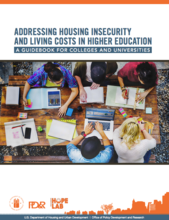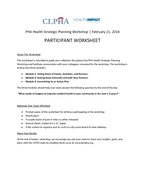Found 858 resources.
0
0
0
Boulder County, Colo., pioneered the movement. What can others learn from their experience?
Topics: Cost effectiveness, Data sharing, Dual-eligibles, Food insecurity, Health, Homelessness, Housing, Legislation & Policy, Low-income, Medicaid / Medicare, Partnerships, Place-based, Supportive housing, West Coast
 Shared by Housing Is
on Jul 5, 2018
Shared by Housing Is
on Jul 5, 2018 0
0
0

It adds to the growing body of evidence that addressing homelessness saves money elsewhere.
Topics: Cost effectiveness, Criminal justice, Health, Healthy homes, Homelessness, Housing, Legislation & Policy, Place-based, Preventative care, Research, Stability, West Coast
 Shared by Housing Is
on Jul 5, 2018
Shared by Housing Is
on Jul 5, 2018 0
0
0
In a new three-part video series, the American Council for an Energy-Efficient Economy explores how energy efficiency can improve people’s health. We hear the stories of homeowners in three states. To look at efficiency’s impact in rural areas, Part One takes us to McDowell County, West Virginia.
Topics: Asthma, Energy, Green, Health, Healthy homes, Housing, Place-based, Safety, Seniors, Sustainability
 Shared by Housing Is
on Jul 5, 2018
Shared by Housing Is
on Jul 5, 2018 0
0
0
Over the past year, the United States Conference of Mayors and the Brookings Institution, along with the Project for Public Spaces have worked together to capture a new model of growth that is emerging in cities and the particular roles that mayors can play.
Topics: Asset building, Community development, Cost effectiveness, Funding, Legislation & Policy, Place-based, Research
 Shared by Housing Is
on Jul 5, 2018
Shared by Housing Is
on Jul 5, 2018 0
0
0
Topics: Community development, Cost effectiveness, Housing, Legislation & Policy, Low-income, Metrics, Partnerships, Place-based, Research, Stability, Workforce development
 Shared by Housing Is
on Jul 5, 2018
Shared by Housing Is
on Jul 5, 2018 0
0
0
A Promising Approach to Improving Student Outcomes
Topics: Child welfare, Education, Funding, Mental health, Metrics, Place-based, Research, Youth
 Shared by Housing Is
on Jul 5, 2018
Shared by Housing Is
on Jul 5, 2018 0
0
0
Topics: Child welfare, Early childhood, Education, Mental health, Post-secondary, Research, Safety, South, Youth
 Shared by Housing Is
on Jul 5, 2018
Shared by Housing Is
on Jul 5, 2018 0
0
0
Chicago’s troubling homicide rate could be significantly reduced through a massive increase in state spending for Chicago schools.
Topics: Child welfare, Community development, Cost effectiveness, Education, Funding, Legislation & Policy, Low-income, Midwest, Research, Safety, Youth
 Shared by Housing Is
on Jul 5, 2018
Shared by Housing Is
on Jul 5, 2018 0
0
0
A Nashville elementary school takes a comprehensive approach to trauma-informed practices, creating a space where students feel known and supported.
Topics: Child welfare, Depression, Domestic violence, Education, Low-income, Mental health, Safety, Youth
 Shared by Housing Is
on Jul 5, 2018
Shared by Housing Is
on Jul 5, 2018 0
0
0
Topics: Community development, Education, Family engagement, Low-income, Midwest, Post-secondary, Research, Workforce development, Youth
 Shared by Housing Is
on Jul 5, 2018
Shared by Housing Is
on Jul 5, 2018 0
0
0
Education leaders reconvened on Tuesday to continue discussing how to help kids by helping their parents. The approach, known as the “Two-Gen” method is based on data showing a child’s trajectory is largely determined by their parents’ stability.
Topics: Child welfare, Dual-generation, Education, Family engagement, Literacy, Low-income, School-readiness, Workforce development, Youth
 Shared by Housing Is
on Jul 5, 2018
Shared by Housing Is
on Jul 5, 2018 0
0
0

Why do some neighborhoods appear able to launch effective local improvement initiatives, while others are more hampered by fragmentation and mistrust? Why can some communities mobilize diverse constituencies to influence public policy, while others cannot? Answers to these questions may be found in the specific patterns of collaboration that form among community organizations, and between these groups, schools, public agencies, and elected officials, according to MDRC, a preeminent social-policy research organization.
Topics: Asset building, Child welfare, Community development, Data sharing, Dual-generation, Education, Family engagement, Funding, Health, Housing, Legislation & Policy, Low-income, Metrics, Midwest, Mobility, Out-of-school time, Partnerships, Place-based, Preventative care, Research, Safety, Stability, Workforce development, Youth
0
0
0
What is the difference between communities that are able to recover from disinvestment and those that cannot? The answer, according to recent research from MDRC, are the presence of strong social networks.
Topics: Disabilities
0
0
0
Worksheet from CLPHA's February 2018 Health Strategic Planning Workshop, co-facilitated with Health Impact Project and Grantmakers in Health
 Shared by Steve Lucas
on Feb 27, 2018
Shared by Steve Lucas
on Feb 27, 2018 0
0
0
Presentation from CLPHA's February 2018 Health Strategic Planning Workshop, co-facilitated with Health Impact Project and Grantmakers in Health
Topics: Affordable Care Act, CLPHA, Community development, Data sharing, Health, Healthy homes, Homelessness, Housing, Medicaid / Medicare, Mental health, Obesity, Partnerships, Place-based, Research, Supportive housing, TA
 Shared by Steve Lucas
on Feb 27, 2018
Shared by Steve Lucas
on Feb 27, 2018 0
0
0
An interactive tool that aggregates over 500,000 transactions from three programs that drive investment into underserved communities—the Low Income Housing Tax Credit (LIHTC), Community Development Financial Institutions (CDFI) and New Markets Tax Credit (NMTC) programs. The investments support a range of activities, from affordable housing to commercial real estate development, consumer and business lending, and more.
The CIE was built to show geographic comparisons and trends over time in a way that is easily customizable. For example, some users will view the full range of investment...
Topics: Housing, Midwest, Research
 Shared by Abra Lyons-Warren
on Jan 11, 2018
Shared by Abra Lyons-Warren
on Jan 11, 2018 0
0
0
Increasingly, a wide range of entities—housers, educators, cities—are using data sharing as a way to increase effectiveness across systems. Data sharing exemplifies this community of practice’s intent to align systems to improve life outcomes for low-income children. We have many robust examples on the local level and this panel will discuss what data systems beyond local partners can look like and accomplish.
Dennis Culhane, Co-Principal Investigator, Actionable Intelligence for Social Policy, University of Pennsylvania School of Social Policy & Practice
Topics: Asset building, CLPHA, Data sharing, Education, Housing, Low-income, Metrics, Partnerships, Research
 Shared by CLPHA Admin
on Jan 8, 2018
Shared by CLPHA Admin
on Jan 8, 2018 0
0
0
This panel provides updates on the future of ConnectHome, the program’s partnership with Google Fiber, and what’s next for using data to assess the program, as well as lessons learned from Google Fiber’s ambitious initiative to provide free high-speed internet to housing authority residents.
Calvin Johnson, Deputy Assistant Secretary, U.S. Department of Housing and Urban Development
Erica Swanson, Head of Community Impact Programs, Google Fiber
Topics: Broadband, CLPHA, Education, Low-income
 Shared by CLPHA Admin
on Jan 8, 2018
Shared by CLPHA Admin
on Jan 8, 2018 0
0
0
Anchor institutions can provide invaluable expertise, as well as serve as reliable third party entities, especially in our resource-constrained environment. Chicago Housing Authority and the University of Chicago describe how their partnership has increased their efforts and made it more efficient.
Cassandra Brooks, Education Specialist, Chicago Housing Authority
Denali Dasgupta, Researcher, Chapin Hall, University of Chicago
Nick Mader, Senior Researcher, Chapin Hall, University of Chicago
Topics: CLPHA, Education, Housing, Low-income, Midwest, Partnerships, Place-based, Research, Stability
 Shared by CLPHA Admin
on Jan 3, 2018
Shared by CLPHA Admin
on Jan 3, 2018 0
0
0
James Cole, Jr., U.S. Department of Education General Counsel/Delegated the Duties of Deputy Secretary, gives a keynote speech at CLPHA's 2016 Affordable Housing & Education Summit.
Topics: CLPHA, Education, Housing, Legislation & Policy, Partnerships
 Shared by CLPHA Admin
on Dec 22, 2017
Shared by CLPHA Admin
on Dec 22, 2017 0
0
0
HUD Secretary Julián Castro gives the keynote address at CLPHA's 2016 Affordable Housing & Education Summit.
Topics: CLPHA, Housing, Legislation & Policy, Low-income, Partnerships
 Shared by CLPHA Admin
on Dec 22, 2017
Shared by CLPHA Admin
on Dec 22, 2017 0
0
1

Topics: Education
 Shared by Cassandra Brooks
on Dec 12, 2017
Shared by Cassandra Brooks
on Dec 12, 2017 0
0
0
Topics: Education
 Shared by Cassandra Brooks
on Dec 12, 2017
Shared by Cassandra Brooks
on Dec 12, 2017 0
1
1
Youth Villages is one of the nonprofits highlighted in this year’s annual giving guide released on Monday by the Center for High Impact Philanthropy at the University of Pennsylvania. The center, which researches and promotes charities that offer the most effective social good in specific areas, says one in eight people ages 16 to 24, or 4.9 million nationally, are considered disconnected, meaning that they don’t have a job and are not in high school or college. The rate is considerably higher in rural areas than urban ones. While these numbers have dropped since the depth of the Great...
Topics: Foster care, Homelessness, Housing, Workforce development, Youth
 Shared by Abra Lyons-Warren
on Nov 7, 2017
Shared by Abra Lyons-Warren
on Nov 7, 2017 

